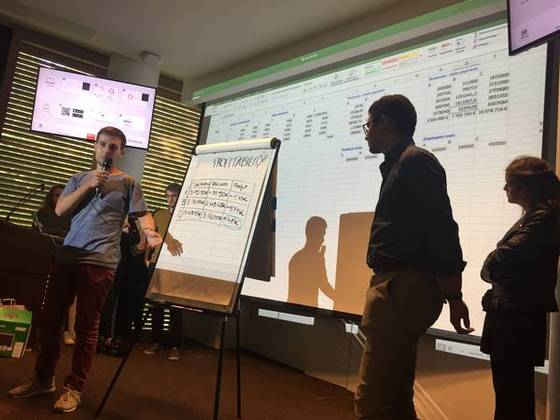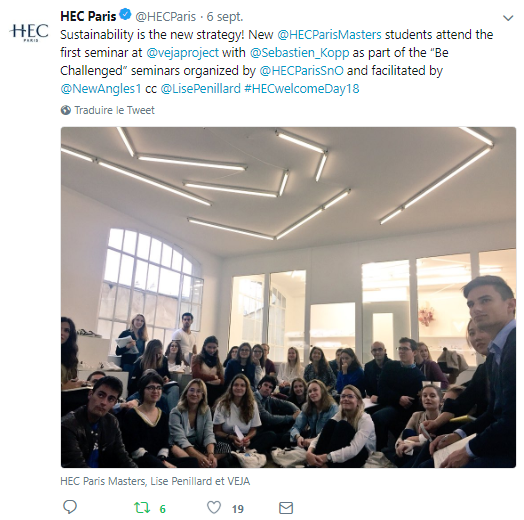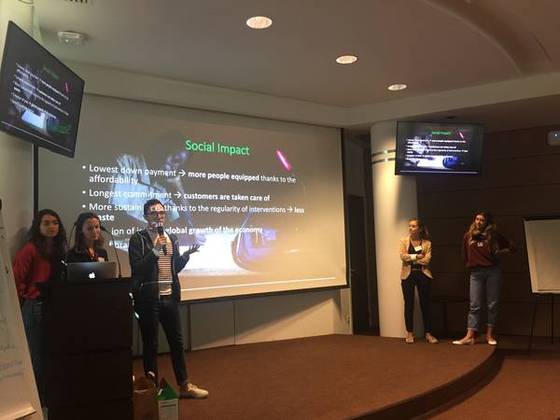Sustainability is the New Strategy
During the “Sustainability is the New Strategy” Challenge on September 6-7, 2018, fifty HEC Paris M1 students learned how sustainability challenges are radically reshaping the way we think and do business. Through various case studies with Veja and Schneider Electric, the students witnessed how enterprises can integrate sustainability at the heart of their business model and strategies. The seminar gave them insight and the tools to rethink and delve into deeper discussions with professors throughout their respective master’s programs at HEC Paris. The two-day Challenge, organized by Jacob Mayne and Amanda Harding from New Angles and the HEC Paris S&O Center, also encouraged the students to rethink their own journey as business school students and professionals.

Veja cofounder, Sebastien Kopp, opened the HEC Paris Challenge “Sustainability is the New Strategy” with a powerful question, “Would you send your 18 year-old child to work six months in your value chain? In the cotton fields or in the factories where your shoes are produced? I would, and I would be happy to!” Veja has been making environmentally friendly sneakers, infusing each stage of production with a positive impact since 2005. Kopp challenged the fifty interdisciplinary, international M1 students to reflect on notions of value, growth, and communication. In this era of transparency, not taking into account the social and environmental impacts of the company equates to a shortsighted strategy.
After meeting the Veja team, the students interacted with professionals working in various sectors to discuss and test their assumptions of business. They encountered concrete cases of companies working to embed sustainability at the core of their business model and discussed the challenges and limitations of these strategies. The speakers, including Marc Gosselin who worked 30 years at Danone, proved a fantastic commitment to the Challenge. “We believe these two days energized and inspired the students and showed them new levers of success,” explains Lise Penillard, the Executive Director of the MSc in Sustainability & Social Innovation at HEC Paris.

Tweet ©HEC Paris S&O
The students spent the next day at the Schneider Electric headquarters where Gilles Vermot-Desroches, Sustainability and Inclusive Business Senior Vice-President of Schneider Electric, began by defining Corporate Social Responsibility (CSR) as building answers to two fundamental questions: how can a company behave like a responsible citizen? And can a company contribute to society?
Thomas André, Strategy & Performance Director of Schneider Electric’s Access to Energy program, and Christophe Poline, Sustainable Investment Director, then challenged the students to put themselves in the shoes of an impact investor assessing three business models distributing solar home systems in Kenya on two dimensions: economic sustainability and social impact. What is at stake? The development of access to energy for the 1 billion people to whom it is not yet available. The exercise helped the students become aware of some of the key issues in addressing low-income markets and the delicate balance between financial viability of the enterprise and affordability of its products, for example.

Challenge Sustainability is the New Strategy ©HEC Paris S&O
HEC Paris students at Schneider Electric headquarters on September 7, 2018
“The two-day Challenge motivated the students to have a positive impact and bring change from within the private sector. The seminar also showed the diversity of impact-driven careers,” says Penillard. The facilitators encouraged students to continue to be curious, ambitious, and to get involved, whether through courses or fieldwork at HEC Paris, or throughout their future professional endeavors.